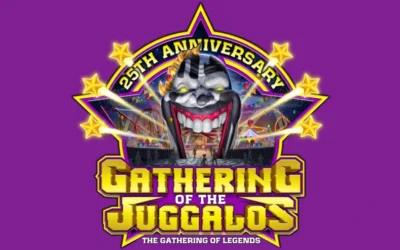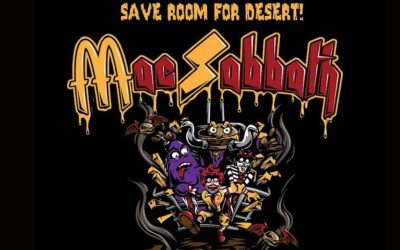Black Sabbath is reuniting for Ozzy Osbourne’s farewell gig this summer, though fans hoping to make it to the coveted event left the ticket sale empty-handed.
The original members of Black Sabbath — Osbourne, Tony Lommi, Geezer Butler, and Bill Ward — will take over Birmingham, England’s Villa Park for an all-day concert on July 5. Throughout the day, Ozzy will also perform a solo set, while Metalliza, Slayer, Pantera, Alice in Chains, Gojira, and more metal icons will take the stage, as well as acts like Smashing Pumpkins frontman Billy Corgan, David Draiman of Disturbed, Duff McKagan of Guns N’ Roses, and Limp Bizkit’s Fred Durst. More performing artists will be announced in the coming weeks.
| READ: Black Sabbath, Ozzy Osbourne Reveal Farewell Show with Metallica, Slayer |
This will mark the final performances for both Black Sabbath and Ozzy, specifically because Ozzy has experienced a number of health setbacks in recent years. The 76-year-old had originally launched a solo farewell tour in 2018, however, he was unable to complete the trek. He also had a serious fall in 2019, leading to major surgeries, and talked of his ongoing battle with Parkinson’s disease.
While Sharon Osbourne said that Ozzy is “doing really great” and he’s excited about the show, she said, “For Ozzy right now, it’s definitely: ‘I love you and good night.”
Tickets for the farewell show went on sale Friday, February 14, which followed an artist presale earlier in the week. Thousands of fans took to social media to share their experience and lash out at Ticketmaster for long queue lines and exorbitant ticket prices. Many also complained of Ticketmaster’s use of dynamic pricing, an infamous ticketing practice that increases prices based on demand.
@OzzyOsbourne #ozzyosbourne #ticketmaster
Don’t waste your time people, I was 6149 in the queue, got through and tickets were already sold out @ 10.16 😂 absolute joke,
Oh and the cheapest standing tickets were £340 @TicketmasterUK pic.twitter.com/A95WvJK4CR— A🌸 (@alicja_fit) February 14, 2025
@OzzyOsbourne #ozzyosbourne #ticketmaster
Don’t waste your time people, I was 6149 in the queue, got through and tickets were already sold out @ 10.16 😂 absolute joke,
Oh and the cheapest standing tickets were £340 @TicketmasterUK pic.twitter.com/A95WvJK4CR— A🌸 (@alicja_fit) February 14, 2025
The pain of Ticketmaster 🤬
I took paracetamol at 8am to pre-empt the headache. It’s not helped.The highlight was seeing the price for the standing ticket at the front.
Yes that’s correct … £2932.50 ☠️Each of those texts was being dumped with tickets in the basket & getting… pic.twitter.com/ZmhuLXJezJ
— Lesley – FPL ⚽️ (@Weggster) February 11, 2025
Well the Villa Park Ozzy/Sabbath gig tickets were a complete farce. Scalped up instantly.
Prices were far too steep for the average fan…
My bloodstock festival ticket was cheaper than that gig and that’s for four days, not just one😟 pic.twitter.com/YFUjtV3ou3— Haggis Horror (@turasatana1) February 14, 2025
Okay those black sabbath ticket prices are ridiculous if im not shooting heroin with Ozzy for that amount it aint worth it
— Trycketh (@Trycketh) February 11, 2025
Them sabbath ticket prices hahahahah and ozzy will pull out a week before 🤣 800 quid get ye head tested if you’re paying nearly a grand to stand pic.twitter.com/jDpN0NmyGX
— Bluegoblin 😾 (@Bluegoblinagain) February 11, 2025
Ozzy Osbourne and his ticket prices can go f#ck themselves! I ain’t paying those prices! Had 2 tickets at 280 and when it came to basket, they changed to 400 a ticket! I thought genocide Keith was stopping all this?
— I’m still here ☭ 🇵🇸 (@tracyann4322) February 12, 2025
Pre-Sale for the final show of #BLACKSABBATH and #OZZY
in #Birmingham.
Ticket prices are totally insane. pic.twitter.com/26TrhFYWyA— Ekel Alfred (@Mick_Raehne) February 13, 2025
Yesterday… queued for waiting room. Ended up with 30,000 people in front and tickets left were £2932 each!!! Today… logged in ready via Download Family. I don’t know how I could do any more to get in a better queuing position 😭 @TicketmasterUK #BackToTheBeginning #OZZY pic.twitter.com/UznAltQxiD
— Sian Morgan 🌹🤘🏼🧩 (@sianybach) February 13, 2025
| READ: Fans Left Shocked at Beyonce’s ‘Cowboy Carter’ Tour Ticket Prices |
Black Sabbath fans aren’t alone; Beyonce’s Cowboy Carter Tour went on sale last week, and fans faced similar problems, citing shockingly egregious ticket prices. Fans reported seeing standing tickets for £224 (279), with some tickets as high as £700 ($872) per seat. Some showed screenshots of Ticketmaster visibly raising ticket prices from the initial fan presale versus the Verizon presale, while others pointed out the use of “dynamic pricing.”
Amid the high ticket prices, many fans were met with even further frustrations over the past week as Ticketmaster wrongfully blocked or paused thousands of user accounts due to alleged “bot activity.”
Ticketmaster CS’ replies on X were flooded with questions and frustrated comments from Ticketmaster users in the UK on Wednesday, claiming that the ticketer has either “paused” or “blocked” their account, meaning they are unable to buy tickets or access their existing tickets. Ticketmaster cited “unusual behaviour on either your network or your browser.”
| READ: Thousands of Ticketmaster UK Accounts Wrongfully Blocked Due to ‘Bot Activity’ |
Ticketmaster’s response to each query offers the same suggestion: clear your cache/cookies, ensure you aren’t using any VPN software on your device/WiFi, use a different browser/device or mobile data instead of WiFi, or try using incognito mode on your browser. Despite these suggestions, fans are still complaining that their accounts are blocked. After following all of their suggestions, Ticketmaster asks customers to contact their team directly.
Over the past year, concertgoers across all genres — from Green Day and Sleep Token to Sabrina Carpenter and Olivia Rodrigo — have complained of Live Nation and Ticketmaster’s system, pointing to dynamic pricing. This infamous ticketing practice causes prices to increase based on demand — a practice that was banned in Australia this year and even shortlisted by the Oxford Dictionary for Oxford Word of the Year 2024.
Legislators have called-out Ticketmaster and its parent company, which are now the targets of an antitrust lawsuit brought forth by the Department of Justice and 39 states alongside the District of Columbia. The suit aims to break-up the pair, citing anticompetitive and monopolistic business practices.




